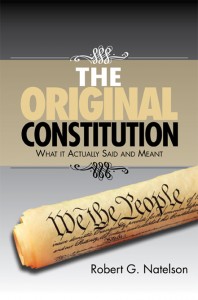To justify the huge growth of federal regulations over the last few decades, lawyers and judges frequently cite the Constitution’s Necessary and Proper Clause (I-8-18). But is that provision really broad enough to authorize what they claim it authorizes?
This little essay focuses on the meaning of the word “necessary.” Early legal documents—used by English lawyers, but written in Latin— offer some clues about what that word was intended to mean.
The Origins of the Necessary and Proper Clause, a book published in 2010 by Cambridge University Press, was authored by four scholars of differing political views—of whom I was one. The research summarized in the book found that the “necessary” portion of the Clause did not actually grant Congress additional authority. It merely assured the reader that the Constitution, unlike the Articles of Confederation, gave Congress powers “incidental” to those listed.
Chief Justice Roberts apparently followed that research in the portion of his Obamacare decision in which he found that the Necessary and Proper Clause did not authorize the federal health care law.
During the Founding Era (and today also, in most contexts), an incidental power was one that met the following requirements:
* It was subsidiary to—less important than—a listed or “principal” power. Founding-Era lawyers said an incidental power had to be less “worthy” than the principal.
AND:
* It was either
(i) a customary way of exercising the listed power or
(ii) reasonably necessary to its exercise. Founding-Era lawyers summarized “reasonably necessity” by saying that an incidental power had to be one that, if absent, would subject exercise of the principal power to “great prejudice.”
Let’s consider an example: The Constitution grants Congress authority to regulate “Commerce . . . among the several States.” That is a principal power. This gives Congress authority over interstate trade among merchants together with a few associated activities, such as commercial finance, cargo insurance, international brokerage, and navigation.
But today, Congress also regulates manufacturing in detail, claiming that doing so is “incidental” to the regulation of interstate commerce. But that claim really doesn’t wash, because manufacturing is at least as important an economic activity (as “worthy” as) as interstate trade among merchants. So it cannot be subsidiary to commerce. (On the other hand, Congress may regulate some aspects of manufacturing that are subsidiary to and closely connected to commerce, such as the labeling of goods about to be sent across state lines.)
The meaning of “necessary” as embracing only subsidiary powers is strange to us today. But that’s the way Eighteenth Century legal documents used the term.
Why so? Well, “necessary and proper”-type provisions were based on earlier instruments composed when English lawyers wrote most legal documents in Latin. For instance, a 1724 book of legal forms contained this forerunner of the Necessary and Proper Clause:
“ad facienda exsequenda et expediendia omnia et singula et necessaria fuerint aut opportuna. . . . ”
(I’ve spelled out the phrase’s abbreviations.)
Notice the words necessaria and opportuna, the neuter plural forms of necessarius (necessary) and opportunus(proper).
In Latin, an important meaning of necessarius is a person connected to you. It can refer to a close relative, associate, and in particular to a dependent or servant. The Founders had virtually all studied Latin as part of their basic education, and as constitutional historian Forrest McDonald points out, there are many echos of Latin usage in the Constitution.
So you can see how the term necessaria—“necessary”— could come to refer to a power subsidiary and connected to larger power.
- The Truth about the Much-Abused Commerce Clause - February 28, 2024
- The Meaning of “Regulate Commerce” to the Constitution’s Ratifiers: An Update - February 7, 2024
- Why It May be Impossible to Disqualify Trump from the Presidency - January 8, 2024

